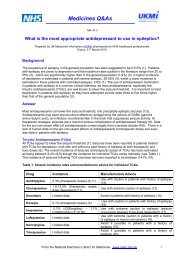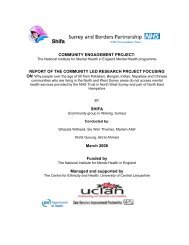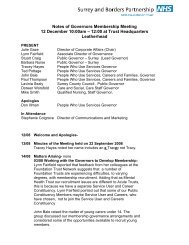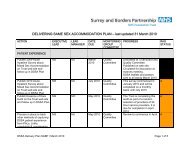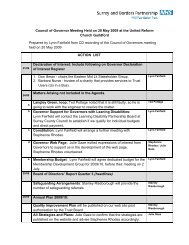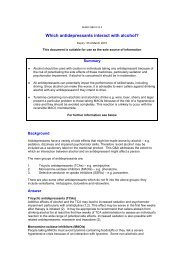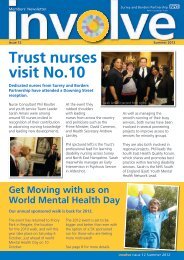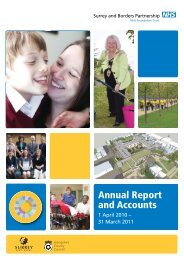Here - Surrey and Borders Partnership NHS Foundation Trust
Here - Surrey and Borders Partnership NHS Foundation Trust
Here - Surrey and Borders Partnership NHS Foundation Trust
You also want an ePaper? Increase the reach of your titles
YUMPU automatically turns print PDFs into web optimized ePapers that Google loves.
school exposure to psychiatry as an<br />
influence on their ultimate choice of<br />
specialty, even if their career choice was<br />
made after leaving medical school (Dein<br />
et al, 2007). Several studies have found<br />
that intentions of students to pursue<br />
psychiatry as a career were increased<br />
following exposure to a psychiatric<br />
attachment during their years at medical<br />
school. Specific factors are likely to be<br />
associated with a greater intention to<br />
pursue psychiatry as a career following a<br />
psychiatric attachment; namely receiving<br />
encouragement from consultants, seeing<br />
patients respond to treatment <strong>and</strong> having<br />
direct involvement in patient care<br />
(McParl<strong>and</strong>, 2003).<br />
Positive elements of career in psychiatry<br />
which have been identified as appealing<br />
to prospective trainees are empathy for<br />
patients with a mental disorder, better<br />
working conditions, <strong>and</strong> the interface of<br />
psychiatry with neuroscience <strong>and</strong> the<br />
social sciences (Dein et al, 2007). Other<br />
factors identified as being important<br />
when choosing psychiatry as a specialty<br />
are enthusiasm <strong>and</strong> commitment for the<br />
specialty, <strong>and</strong> self appraisal of one’s own<br />
skills <strong>and</strong> aptitudes (Goldacre, 2005).<br />
In the light of the above, it would seem<br />
that focusing on the undergraduate<br />
experience of psychiatry as a target for<br />
increasing recruitment is paramount.<br />
Historically, this has been the reaction to<br />
the recruitment problem, <strong>and</strong> as a result<br />
pre-clinical teaching in psychology, social<br />
science <strong>and</strong> behavioural science now has<br />
a much greater emphasis. Inclusion of a<br />
psychiatry placement is now universal,<br />
however unfortunately it would seem<br />
that in recent years with the ever<br />
exp<strong>and</strong>ing dem<strong>and</strong>s placed on the<br />
curriculum, placements have decreased in<br />
length (Brown et al 2009). As such it is<br />
increasingly important that the best use is<br />
made of these placements, with students<br />
being actively involved in clinical care,<br />
being taught enthusiastically with an<br />
emphasis on evidence based medicine<br />
<strong>and</strong> patient recovery. Psychiatric trainees<br />
may be ideally placed to provide<br />
additional teaching <strong>and</strong> support to<br />
medical students, <strong>and</strong> should be<br />
encouraged to do so by their supervising<br />
consultants. Liaison psychiatry<br />
placements have been identified as being<br />
of particular appeal to medical students<br />
<strong>and</strong> may have special value in aiding<br />
recruitment in the future (Brockington,<br />
2002). Medical students who show an<br />
interest in pursuing psychiatry as a career<br />
should be encouraged <strong>and</strong> given ongoing<br />
support <strong>and</strong> careers advice (Eagles et al,<br />
2007).<br />
Another potential target for recruitment<br />
are those who have not yet entered<br />
medical school. It has been found that<br />
the type of person likely to pursue<br />
psychiatry as a career tends to have an<br />
interest in more psychological,<br />
sociological <strong>and</strong> artistic subjects, with<br />
many tending to have one A-level in a<br />
non-science subject (Brockington, 2002).<br />
They are also more likely to be from a<br />
lower social class, come from cities <strong>and</strong><br />
be politically liberal (Eagle <strong>and</strong> Marcos,<br />
1980). It may be that development of<br />
widening participation schemes <strong>and</strong><br />
graduate entry programmes may result in<br />
a greater number of students with these<br />
interests <strong>and</strong> attributes entering medical<br />
school <strong>and</strong> hence moving into psychiatry,<br />
although the effect of these<br />
developments has yet to be evaluated.<br />
Greater public awareness of mental<br />
health issues <strong>and</strong> the ongoing challenge<br />
of tackling stigma, possibly by<br />
improvement in public education <strong>and</strong><br />
covering of mental health issues as part<br />
of the primary <strong>and</strong> secondary school<br />
curriculum may in time raise the profile of<br />
psychiatry <strong>and</strong> lead to greater<br />
underst<strong>and</strong>ing <strong>and</strong> appeal of the<br />
specialty, however this is unlikely to yield<br />
results in the short term.<br />
Several surveys have identified that the<br />
majority of people choose psychiatry as a<br />
career after graduation rather than<br />
during the undergraduate years<br />
(Brockington, 2002). With this in mind,<br />
increasing positive exposure to psychiatry<br />
during the foundation years may well<br />
have a positive effect on recruitment. By<br />
the end of their first year of work post<br />
Commentary <strong>and</strong> Debate<br />
<strong>Surrey</strong> <strong>and</strong> <strong>Borders</strong> Online Journal www.sabp.nhs.uk/journal 25



